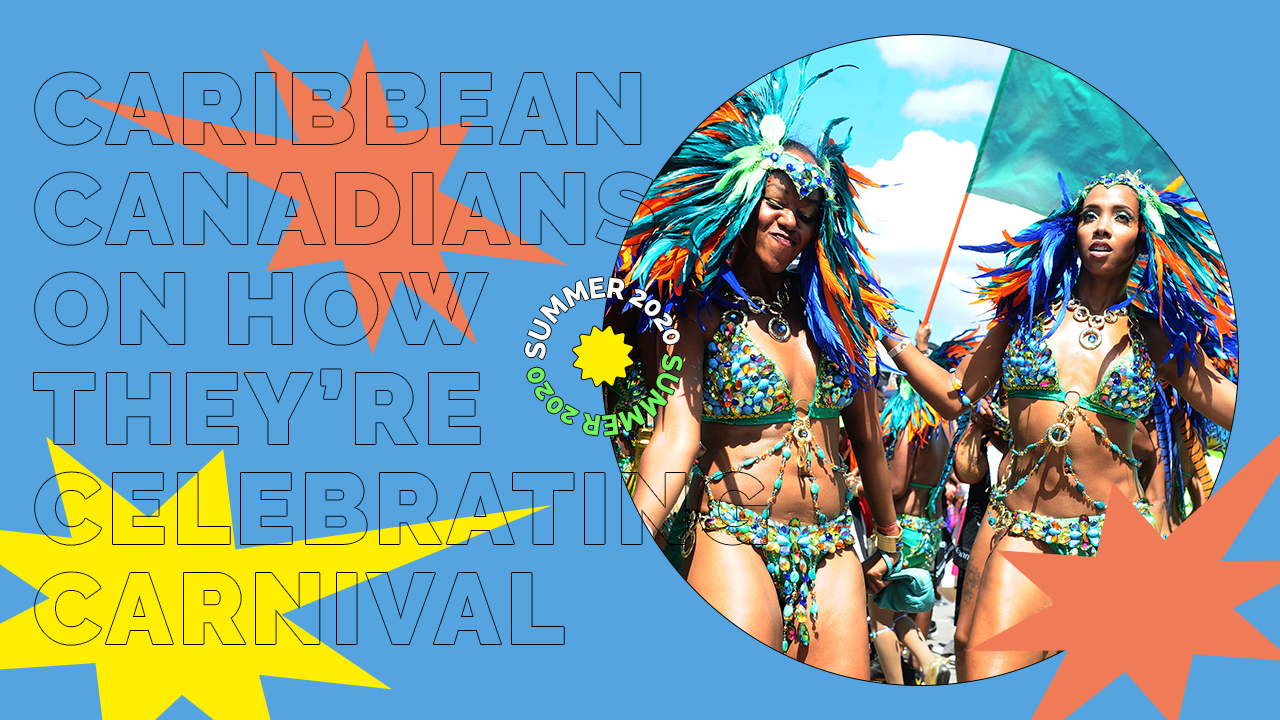How Caribbean Canadians Are Celebrating Carnival This Summer
"We'll be together again, it's really just a matter of time"
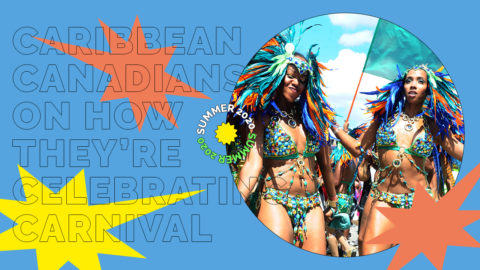
The Carnival tabanca is real. Solidified in song with soca star Bunji Garlin’s 2013 hit by the same name, “Carnival Tabanca” refers to the helpless yearning one feels for Carnival, usually once Carnival season has come and gone. For most of my fellow Carnival enthusiasts, the COVID-19 pandemic has stirred up an extreme tabanca deep in our souls; it’s one thing to feel nostalgic about something you experienced, but quite another to miss something you anticipated.
July 2020 was supposed to find me in St. Lucia, wukkin’ up to some Dennery soca for St. Lucia Carnival. In an ideal time, I’d come back to Toronto after, take a brief break to catch my breath, and then get ready to hit a slate of fêtes for Toronto Carnival (I’ll always call it Caribana). Unfortunately, the pandemic has rendered most of 2020’s Carnivals cancelled, or at least (hopefully) rescheduled. In Toronto, Caribana falls into the former category, and while the main parade has been cancelled, the Festival Management Committee has announced a series of virtual events. And for anyone looking for a 100% pandemic-safe way to celebrate Caribana, check out #CaribanaCyahDun on Twitter, a hashtag created to document and archive photographs and videos from past Caribanas in order to keep the vibes flowing. “Despite Caribana’s absence this year, the hashtag proves that we’re here and #CaribanaCyahDun,” says Martika Gregory, one of the creators behind the hashtag.
Even though I know it won’t be the same as wukkin’ up on a boat cruise or chippin’ down the Lakeshore in a magnificent costume, I’m looking forward to indulging in the virtual experience this year. Just because Caribbean people don’t have the same outlets for expression, it doesn’t mean that the love for Carnival is any less strong. One thing you can’t dilute is the spirit and creativity of the Caribbean, and that’s what will get us through this moment until we can free up again safely. Until then, here’s how some Canadian Carnival lovers are dealing with their tabanca this year.
Jaeda Laurez, project manager
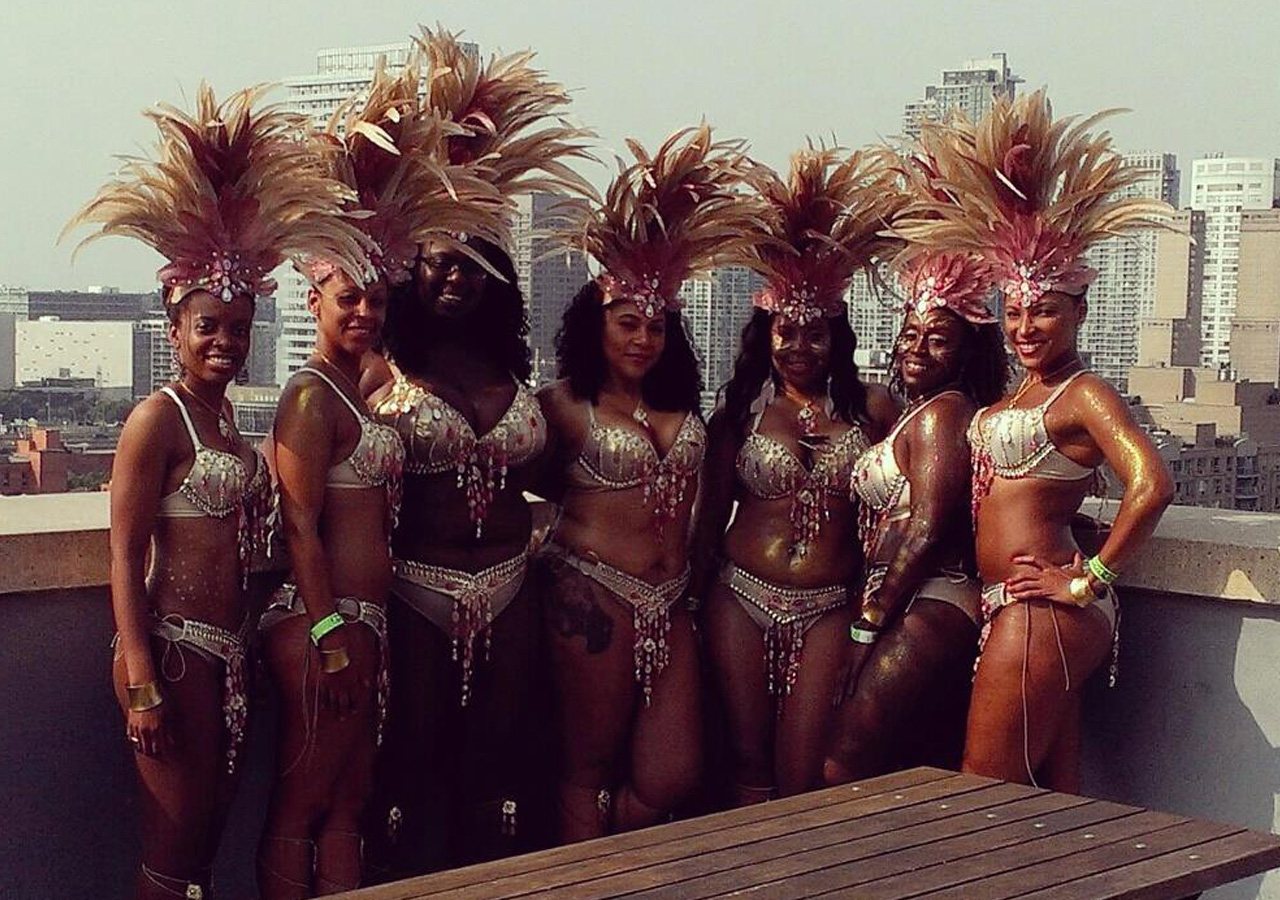
“Carnival is a reminder to me of the support I carry with me during the year, and a joyful protest. All due respect to my partner, who is entirely uninterested in crowds or loud music, Carnival time is for my girls. When I think about being on the road, I’m usually with my closest friends; it’s something we’ve made a conscious effort to do every year and whenever one of us has to miss it, we feel it, deeply. Black bodies, especially Black women’s [bodies], are policed and marginalized in so many ways in larger society. To free up and play mas, where “everyBODY play ah mas,” as the slogan goes, is to see women with every skin tone and body type look and feel beautiful and be celebrated. Having the space to wear something as risqué as you dare without judgement and—depending on where you play—relatively safely, is a life-changing experience. [Editor’s note: Mas is short for masquerade and refers to the big parades that occur globally, where participants don costumes and masks, play music, dance and celebrate].
“I’m still figuring out what that is going to look like this summer, since out of a reasonable public health concern almost every event has been cancelled. But in the meantime, [the community] will still plan for next year, still share soca mixes and joke about what shenanigans might have been. We’ll be together again, it’s really just a matter of time.”
Trixie Williams, director of the cardiovascular and stroke programs at Scarborough Health Network

“The ability to release and enjoy the colourful costumes and high-spirited festivities is a total addiction for me when I think of mas. Planning and gearing up to that special day(s) is what brings me the most excitement in an experience that helps me refresh and reset. The tradition of mas in Trinidad—the Carnival I love most—started in the late 18th century as dedicated time to let go before the fasting season of lent. I understand this parallel in my life and how I appreciate mas, as I always dedicate this time of the year to embrace the music, exuberance, happiness, jovial laughter and companionship that help describe the feeling I ‘catch’ during Carnival season. So whether in Trinidad for Carnival or Toronto for Caribana (a.k.a. Toronto Caribbean Carnival), I will maintain my celebration of Caribbean Carnival culture in Toronto by listening to Dr. Jay de Soca Prince and PanMan on Duty, while taking a wine and enjoying the Caribbean cuisine cooked by none other than my amazing husband in our backyard. Let the culture and the music play on!”
Glenna Sandy, hairstylist and entrepreneur
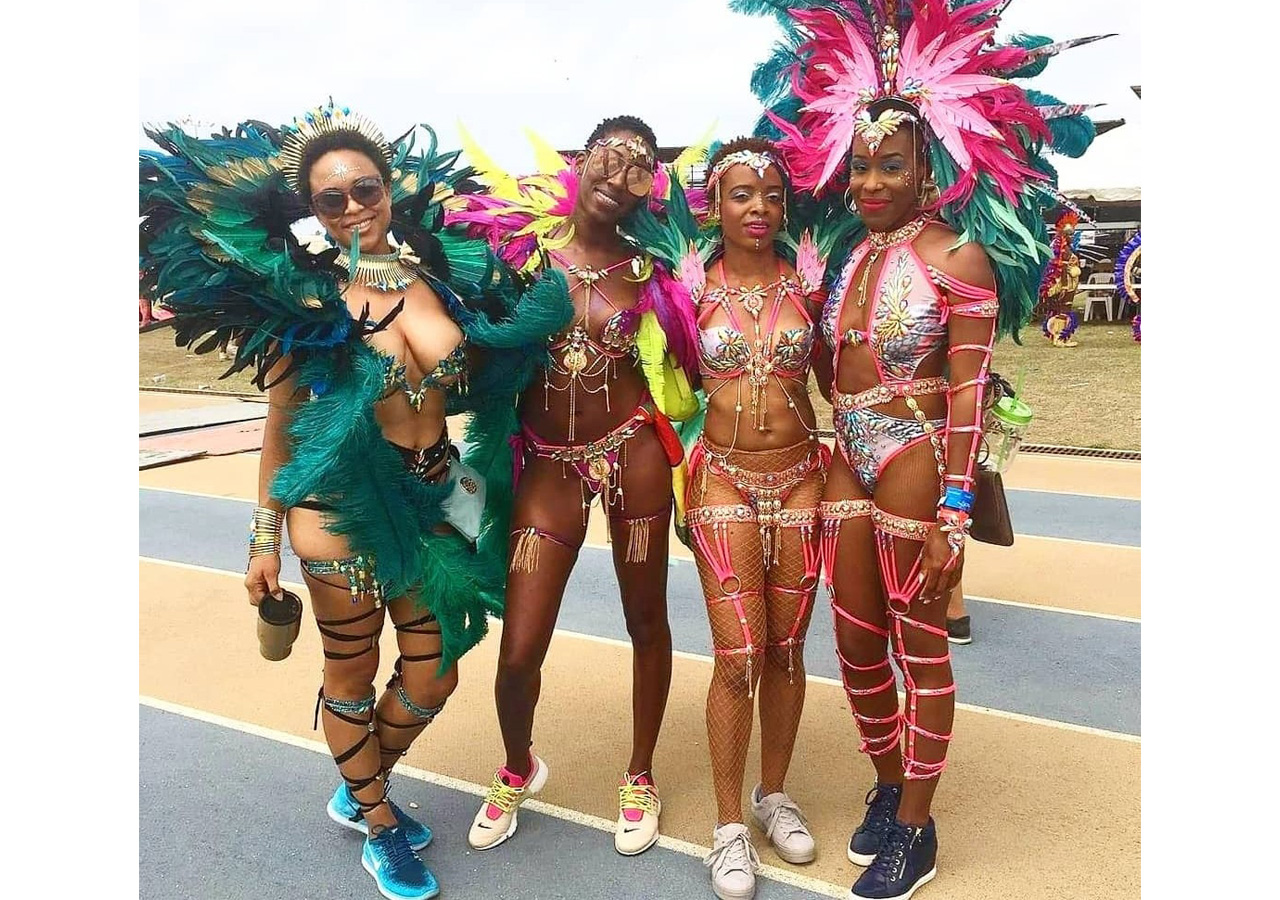
“Carnival is a celebration of independence. I remember growing up in Toronto and heading down on University Avenue to watch the parade with family. There have been location and name changes since then, but it was always a celebration. Much later in life, I got to play mas five or six times with friends in Toronto, and that was always a great time for us to get together and ‘free up’ without a worry in the world. A couple years back, I participated at Crop Over, the Carnival that takes place in Barbados. What a time! This year I had plans with friends to return to Crop Over, but due to COVID-19, our plans were cancelled. For some of us in the same city, we may go to a park or a beach with our island flags, while wearing vibrant colours for a socially distanced get-together to celebrate the time of year and what it generally means for us.”
Pascale Diverlus, community organizer and equity educator
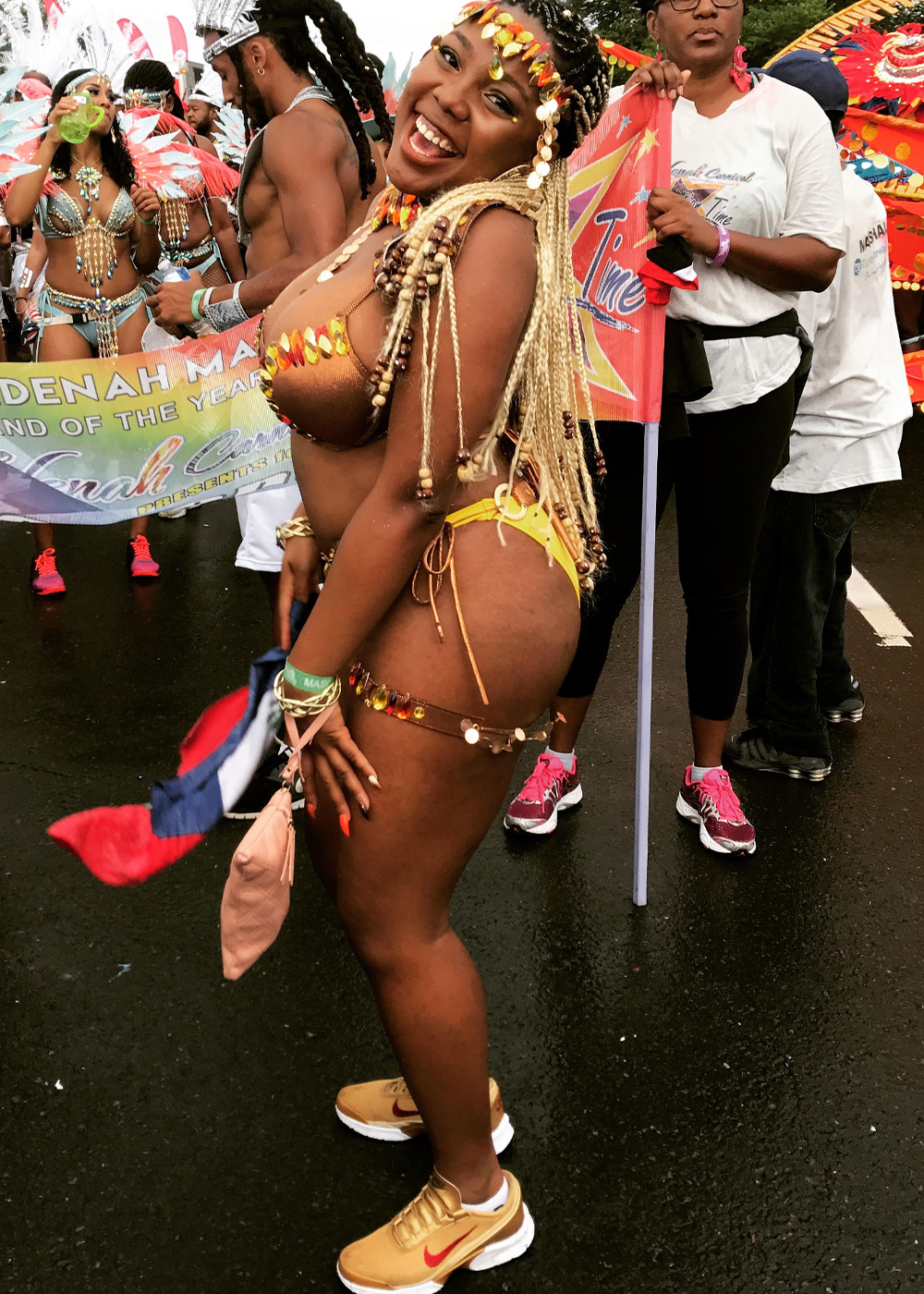
“Carnival to me is freedom. It is the ultimate rejoicing and acknowledgement for the fight our ancestors won and the fight we commit to continuing. For people like me in the diaspora, it feels like one of the few days of the year we can just be. There’s a connection I feel to my family in Haiti and all over the islands. Wukkin’ our waist, hands in the air, there is no greater joy.
“Without Carnival this year, I’m going to spend it in my living room, playing the loudest soca I can.”
Tereka T, dancer and performing artist
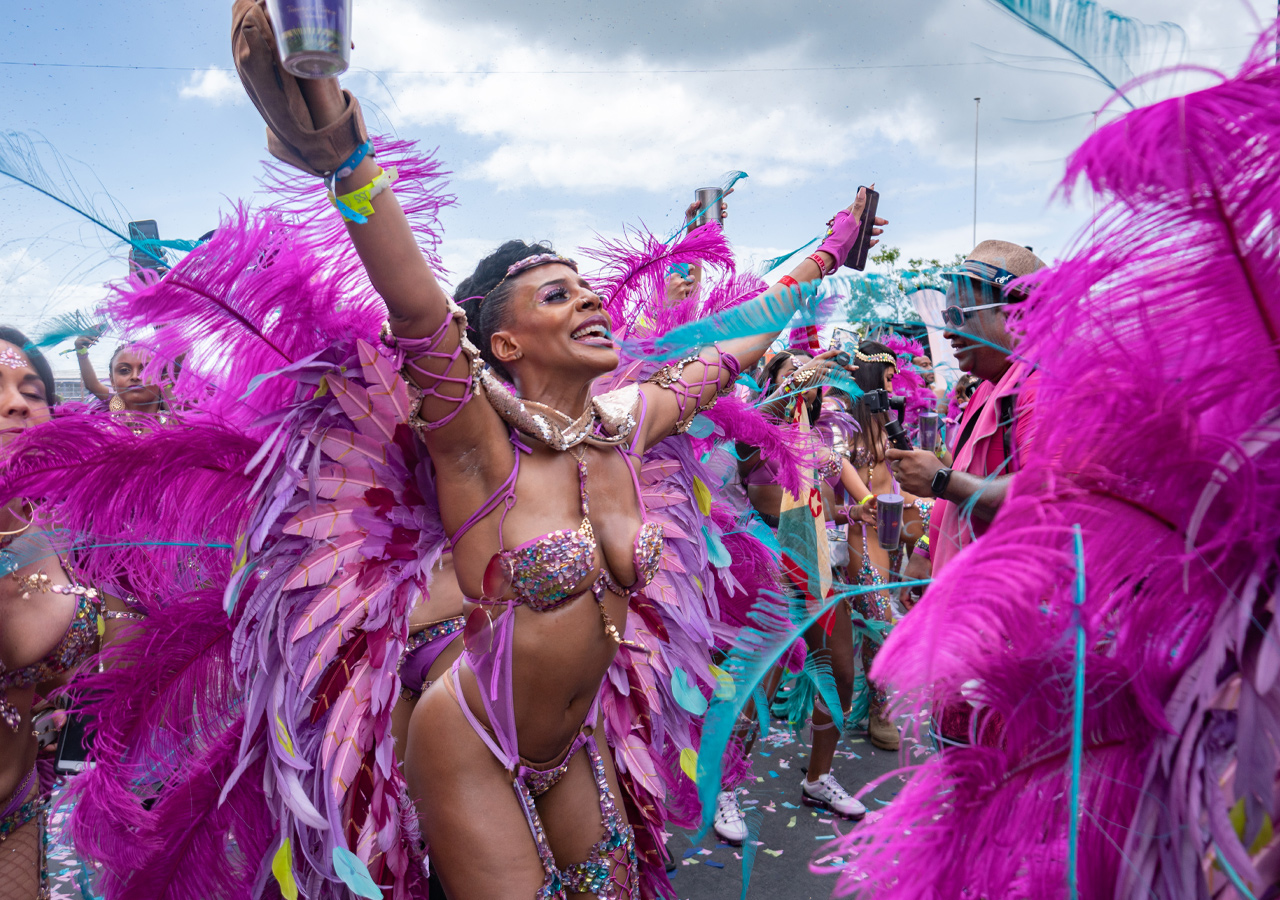
“Carnival in both its traditional and modern depictions has become a major part of my everyday life and is truly a love and passion. I’ve been playing mas in Toronto for about 15 years and modelling mas, performing and doing promotional work for 10 years, so the Carnival community is also a family. In my professional life, I’ve been training in Samba No Pé and learning about Carnival from the Brazilian perspective.
“I look at Carnival as a testament to my ancestor’s determination to hold on to their traditions, to pass down their history, to connect to their spiritual guides, to mock, to rebel and to celebrate life in the face of adversity. It also continues to be a brilliant display of creativity, ingenuity, storytelling and humour. There is no time I feel more free and connected to the journey of my ancestors than when I am on the road, even as the direction of mas continues to trend towards mass appeal.
“Although I was lucky enough to make it to Trinidad Carnival this year, due to COVID-19 I had to cancel a May Carnival trip and will of course be missing out of this year’s festivities in Toronto. I will be at home streaming all the soca and Carnival music I can and supporting artists that are still coming out with great music despite the times.”
Nneka Elliott, actor and TV personality
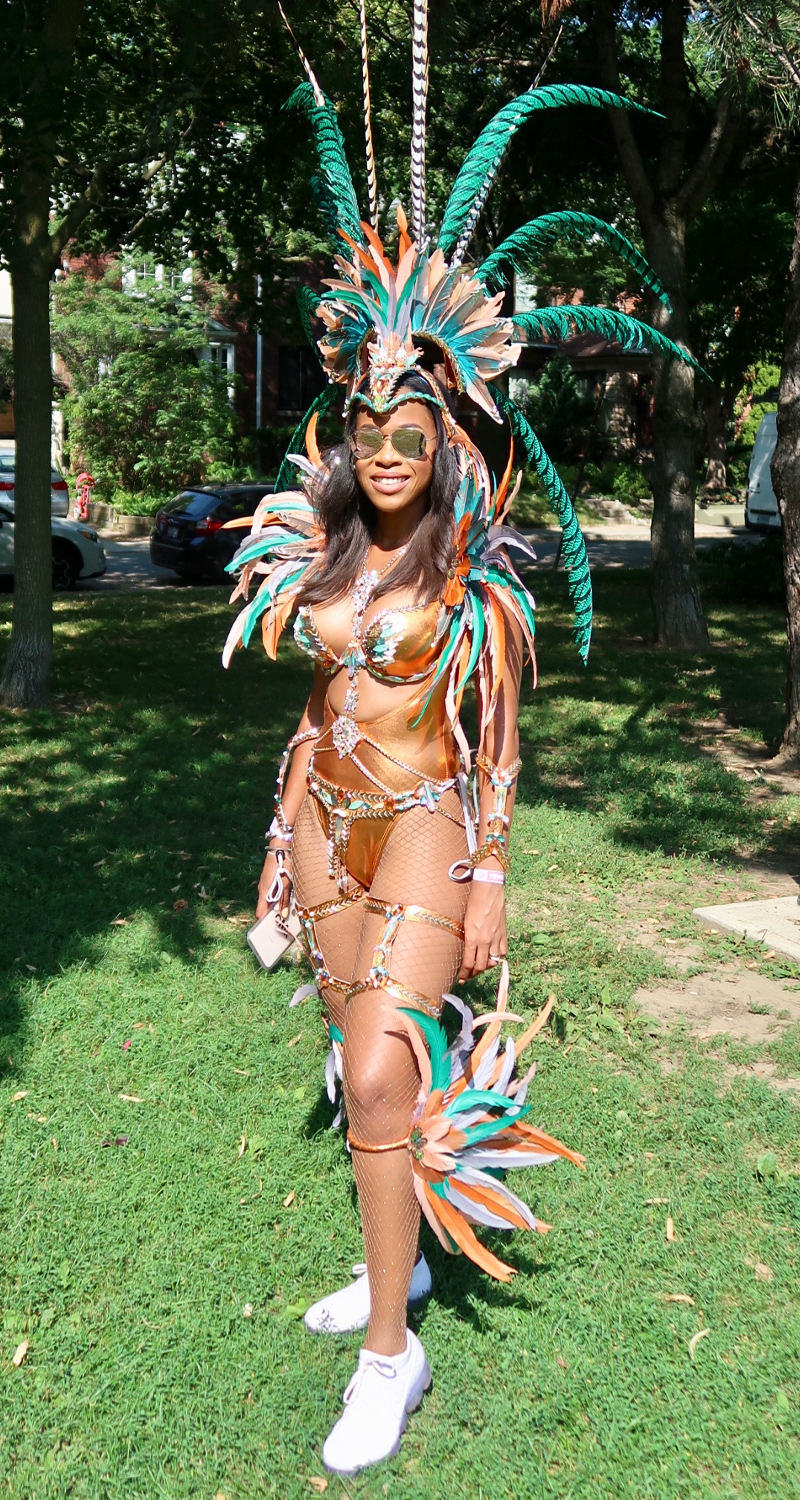
“I come from a family deeply rooted in mas. My dad Walter Elliott is a veteran designer and mas maker. I’ve been playing mas in Toronto and St.Vincent since I was two. We were actually booked to go to Vincy Mas this year!
“Even when I say ‘I’m not playing this year eh,’ somehow I always end up in a costume whining down the Lakeshore. That’s the pull of my culture. The lure of belonging and the pure joy that you get when you’re feeling yourself in your costume, the soca is reverberating in your chest and you have not a care in the world. However, what I will most miss is the King and Queen of the Band competition. Every year my family, along with close friends, sits in the same spot in the stands. Armed with our Trini and Vincy flags, we cheer on our favourite costumes until we’re hoarse. My favourite part is the way we scream even louder if we hear the announcer say ‘This costume was designed by Walter Elliott.’ My dad lives and breathes mas, and it was something he continued to do despite his recent diagnosis with multiple myeloma. I know he will miss it immensely this year. But best believe we’ll get together in my dad and stepmom’s backyard for some kind of bacchanal. We’ll play music, have some catered West Indian food and talk about our favourite Carnival memories, complete with hilarious re-enactments!”
Samantha Peters, community legal worker, educator and human rights consultant
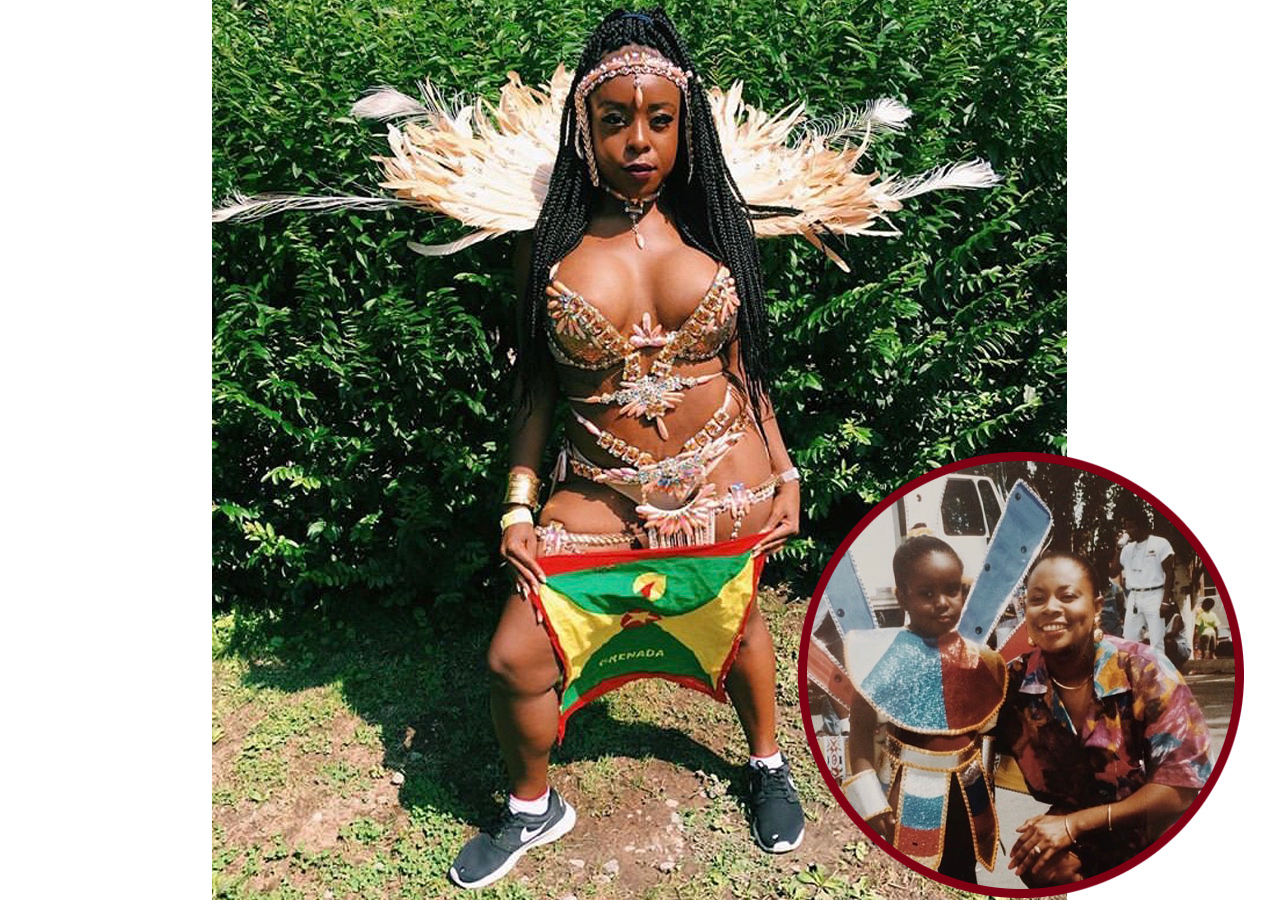
“Carnival has always been something special to me. Soca artist Destra’s words, ‘Carnival is a true freedom,’ truly encapsulates how Carnival makes me feel. I recall my mom and my aunties taking me to kiddie Carnival at Lamport Stadium in Toronto. I remember how the music made me feel, the Black joy around me and how my mom so delicately fixed my costume, making sure that every gem glistened in the sun, that every feather was in its place. She put bright lipstick on me and sprinkled glitter all over my body. I felt so free, so proud and so connected to my Grenadian culture, traditions and ancestors.
“As a sort of rite of passage, I started playing mas in Toronto just shy of my 18th birthday. As I got older, my mom started taking my sisters and I to Grenada for Carnival; from the all-inclusive fêtes and J’ouvert, to pretty mas and the oil down limes on a secluded beach in the country, to ol’ talk by the roadside with elders in my family—I was hooked!
“As Grenada’s Spicemas falls on my birthday, Carnival season has always been a very special time of year for me. This year, my plan was to, again, go to Grenada with my mom, sister and close friends to celebrate my birthday which falls on Carnival Tuesday this year. [Since] I always celebrate Caribbean culture as it is firmly a part of my identity, the loss of Carnival this year has been challenging. Luckily, Spicemas Corporation came through and there will be a virtual Carnival experience. This year, I plan on having a Carnival-themed birthday celebration with my small bubble of close friends. As Black feminist Claudia Jones has emphasized in her work, Carnival is a time of joy and a culture of radical resistance.”
Kelly Singh, head of communications for SpinVFX
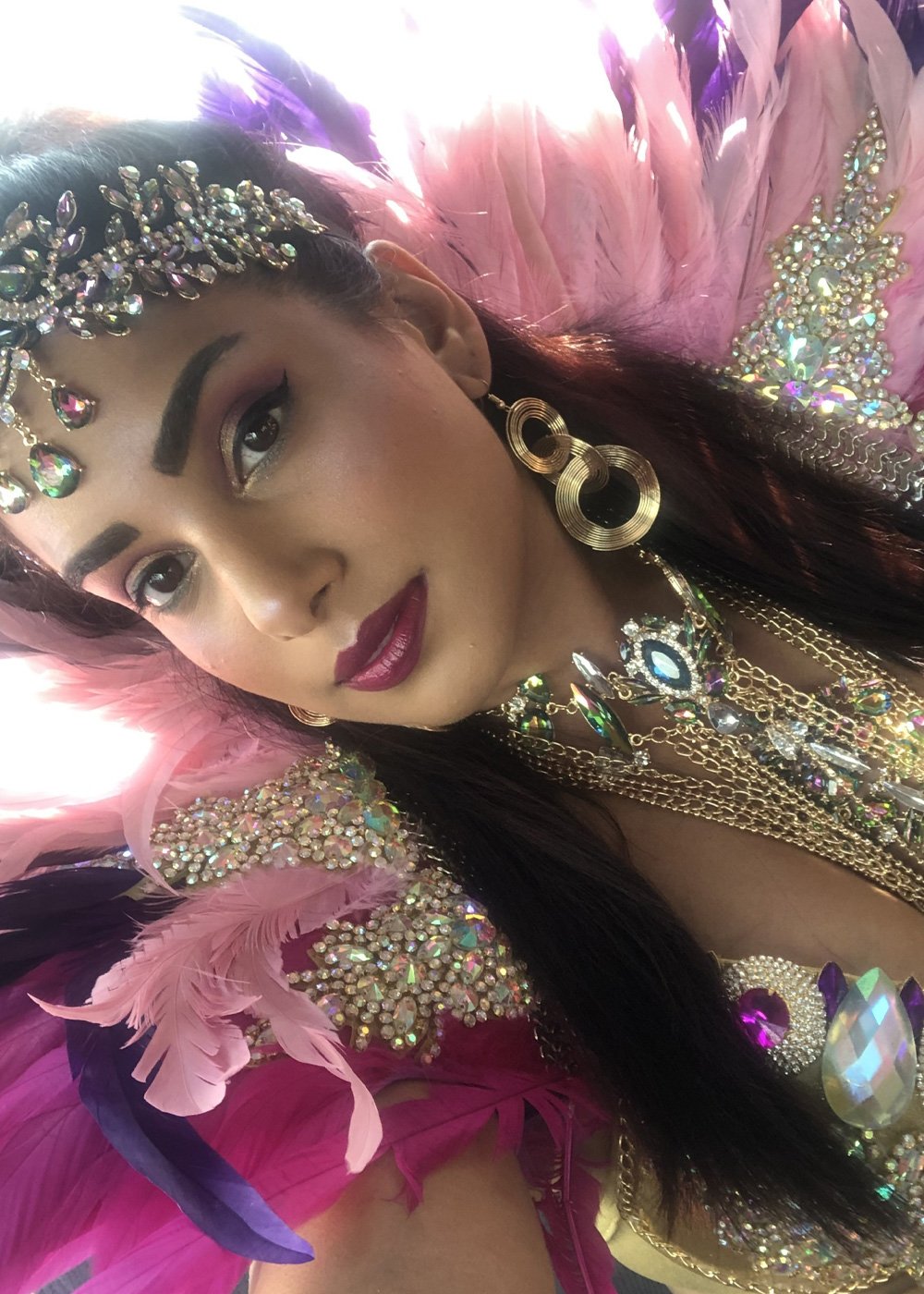
“The thing that I love most about Carnival is the thing that has always been true about Carnival: the opportunity to ‘free up’ as a community. We are busy with our lives, kids, work, school, and other responsibilities every day. In the chaos of everyday life, it can seem silly or even irresponsible to put aside our hard-earned money for costumes and fêtes, to dedicate time in the gym and practice applying glitter ‘just-so’ for a parade. It can be a lonely experience leading up to Carnival, especially when Canada at large doesn’t always hold a high opinion of our cultural expressions. But when the day comes, and you step out into the streets and see that hundreds or thousands of other people made the same effort that you did to come out and have a day where we could be carefree and unapologetically, boastfully ourselves, nothing in the world feels sweeter. That’s when I feel most like I am part of a community and most connected to the true ‘spirit of Carnival.’
“This year, I am celebrating by being hopeful. When the day comes that fêtes and parades can return, I will be ready! I’m motivated by my desire to be ‘my best self’ when the party starts again. I’m learning to cook vegan pan-Caribbean food in an effort to eat more healthily, taking ‘me time’ out of my day to listen to our music to feed my nostalgia and having my own at-home dance parties so that I can make sure that my whining muscle is still in good working condition!”
Tanya Hayles, entrepreneur and freelance writer
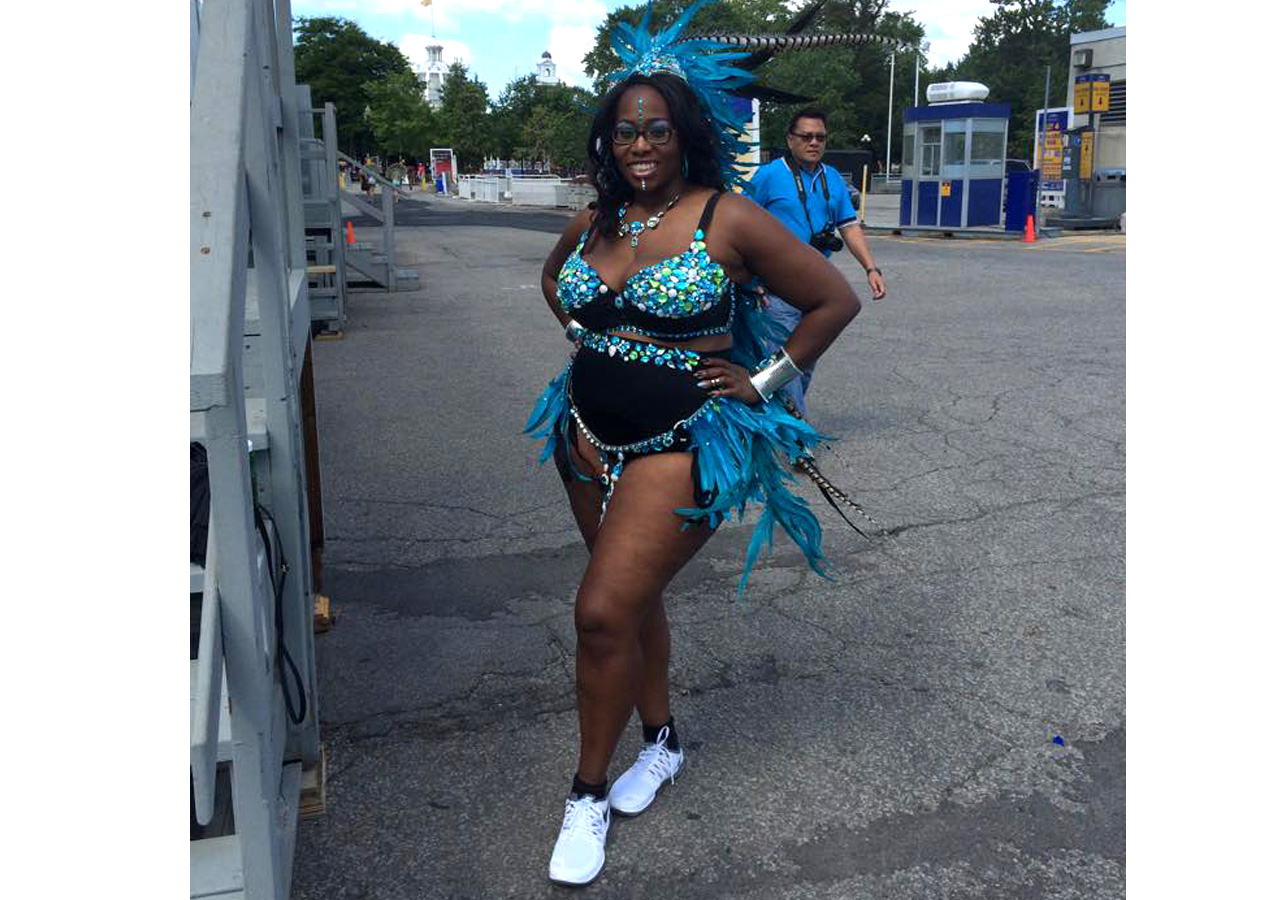
“Despite the Toronto Carnival taking place on my birthday each year (happy birthday to me!), I wasn’t fully immersed in the cultural side until about five years ago. My friend is a veteran to playing mas, so when she took me under her wing as a young protégé, I didn’t realize what I was getting into, nor the impact it would have on me.
“I’m a girl that has been chunky my whole life, so I’ve learned how to mask and hide my body. This includes not wearing anything that shows my knees. After we selected our costumes, I had a sudden fear: I’m going to be OUT there, [with] no place to hide all the bumps and lumps of my body. I decided to wear some tights underneath to stick to my comfort zone. But then we got down there and I saw the sea of mas players—tall, short, fit, flab and fabulous—I decided to free myself up from what I thought others would think of me and what I think of myself.
“This birthday won’t be the same without dancing in the streets, celebrating Trinidad-specific/Caribbean culture, but its impacts remain with me for a lifetime.”


